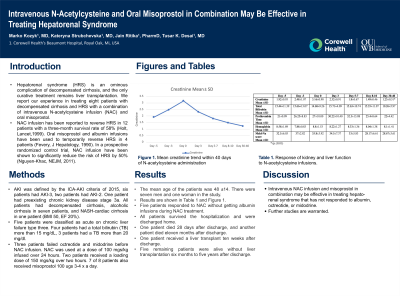Tuesday Poster Session
Category: Liver
P3838 - Intravenous N-Acetylcysteine and Oral Misoprostol in Combination May Be Effective in Treating Hepatorenal Syndrome
Tuesday, October 24, 2023
10:30 AM - 4:00 PM PT
Location: Exhibit Hall

Has Audio

Marko Kozyk, MD
Corewell Health William Beaumont University Hospital
Royal Oak, MI
Presenting Author(s)
Marko Kozyk, MD, Kateryna Strubchevska, MD, Jain Ritika, PharmD, Tusar K.. Desai, MD
Corewell Health William Beaumont University Hospital, Royal Oak, MI
Introduction: Hepatorenal syndrome (HRS) is an ominous complication of de-compensated cirrhosis and the only curative treatment remains liver transplantation. We report our experience in treating eight patients with de-compensated cirrhosis and acute kidney injury (AKI) 2-3, with a combination of intravenous N-acetylcysteine infusion (NAC) and oral misoprostol. NAC infusion has been reported to reverse HRS in 12 patients with a three-month survival rate of 58% (Holt, Lancet, 1999). Oral misoprostol and albumin infusions have been used to temporarily reverse HRS in 4 patients (Fevery, J Hepatology, 1990). In a prospective randomized control trial, NAC infusion have been shown to significantly reduce the risk of HRS by 50% (Nguyen-Khac, NEJM, 2011).
Methods: AKI was defined by the ICA-AKI criteria of 2015, six patients had AKI-3, two patients had AKI-2. One patient had preexisting chronic kidney disease stage 3a. All patients had de-compensated cirrhosis, alcoholic cirrhosis in seven patients and NASH-cardiac cirrhosis in one patient (BMI 50, EF 20%). Three patients had prior episodes of AKI that were treated successfully with NAC. Five patients were classified as acute on chronic liver failure type three. Four patients had a total bilirubin (TB) more than 15 mg/dL, 3 patients had a TB more than 20 mg/dl. Five patients failed to respond to albumin infusions before NAC administration. Three patients failed octreotide and midodrine before NAC infusion. NAC was used at a dose of 100 mgs/kg infused over 24 hours. Two patients received a loading dose of 150 mgs/kg over two hours. 7 of 8 patients also received misoprostol 100 ugs 3-4 x a day.
Results: Mean age of the patients was 48 ±14. There were seven men and one woman in the study. Results are shown in Table 1 and Figure 1 below. Five patients responded to NAC without getting albumin infusions during NAC treatment. All patients survived the hospitalization and were discharged home. One patient died 28 days after discharge, and another patient died eleven months after discharge. One patient received a liver transplant ten weeks after discharge. Five remaining patients were alive without liver transplantation six months to five years after discharge.
Discussion: Intravenous NAC infusion and misoprostol in combination may be effective in treating hepato-renal syndrome that has not responded to albumin, octreotide, or midodrine. Further studies are warranted.

Disclosures:
Marko Kozyk, MD, Kateryna Strubchevska, MD, Jain Ritika, PharmD, Tusar K.. Desai, MD. P3838 - Intravenous N-Acetylcysteine and Oral Misoprostol in Combination May Be Effective in Treating Hepatorenal Syndrome, ACG 2023 Annual Scientific Meeting Abstracts. Vancouver, BC, Canada: American College of Gastroenterology.
Corewell Health William Beaumont University Hospital, Royal Oak, MI
Introduction: Hepatorenal syndrome (HRS) is an ominous complication of de-compensated cirrhosis and the only curative treatment remains liver transplantation. We report our experience in treating eight patients with de-compensated cirrhosis and acute kidney injury (AKI) 2-3, with a combination of intravenous N-acetylcysteine infusion (NAC) and oral misoprostol. NAC infusion has been reported to reverse HRS in 12 patients with a three-month survival rate of 58% (Holt, Lancet, 1999). Oral misoprostol and albumin infusions have been used to temporarily reverse HRS in 4 patients (Fevery, J Hepatology, 1990). In a prospective randomized control trial, NAC infusion have been shown to significantly reduce the risk of HRS by 50% (Nguyen-Khac, NEJM, 2011).
Methods: AKI was defined by the ICA-AKI criteria of 2015, six patients had AKI-3, two patients had AKI-2. One patient had preexisting chronic kidney disease stage 3a. All patients had de-compensated cirrhosis, alcoholic cirrhosis in seven patients and NASH-cardiac cirrhosis in one patient (BMI 50, EF 20%). Three patients had prior episodes of AKI that were treated successfully with NAC. Five patients were classified as acute on chronic liver failure type three. Four patients had a total bilirubin (TB) more than 15 mg/dL, 3 patients had a TB more than 20 mg/dl. Five patients failed to respond to albumin infusions before NAC administration. Three patients failed octreotide and midodrine before NAC infusion. NAC was used at a dose of 100 mgs/kg infused over 24 hours. Two patients received a loading dose of 150 mgs/kg over two hours. 7 of 8 patients also received misoprostol 100 ugs 3-4 x a day.
Results: Mean age of the patients was 48 ±14. There were seven men and one woman in the study. Results are shown in Table 1 and Figure 1 below. Five patients responded to NAC without getting albumin infusions during NAC treatment. All patients survived the hospitalization and were discharged home. One patient died 28 days after discharge, and another patient died eleven months after discharge. One patient received a liver transplant ten weeks after discharge. Five remaining patients were alive without liver transplantation six months to five years after discharge.
Discussion: Intravenous NAC infusion and misoprostol in combination may be effective in treating hepato-renal syndrome that has not responded to albumin, octreotide, or midodrine. Further studies are warranted.

Figure: Figure 1. Mean creatinine trend within 40 days of N-acetylcysteine administration
Disclosures:
Marko Kozyk indicated no relevant financial relationships.
Kateryna Strubchevska indicated no relevant financial relationships.
Jain Ritika indicated no relevant financial relationships.
Tusar Desai indicated no relevant financial relationships.
Marko Kozyk, MD, Kateryna Strubchevska, MD, Jain Ritika, PharmD, Tusar K.. Desai, MD. P3838 - Intravenous N-Acetylcysteine and Oral Misoprostol in Combination May Be Effective in Treating Hepatorenal Syndrome, ACG 2023 Annual Scientific Meeting Abstracts. Vancouver, BC, Canada: American College of Gastroenterology.
